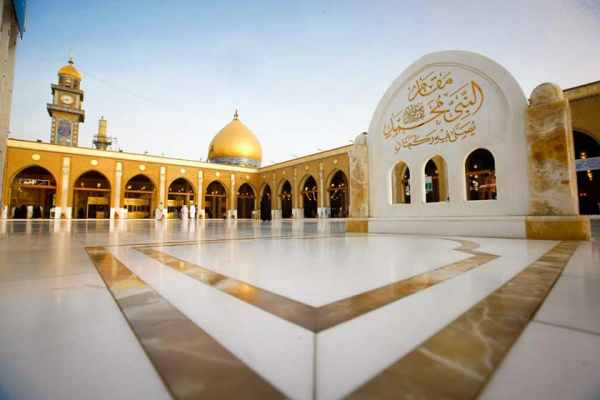Hazrat Fatima (615 – 632 A.D.), mother of the Imams (A), is the daughter of the Messenger of Allah (PBUH) by his first wife, Khadija daughter of Khuwaylid, may the Almighty be pleased with her. Hazrat Fatima was born in Mecca on a Friday, the 20th of Jumada II in the fifth year after the declaration of the Prophetic message which corresponds, according to the Christian calendar, to the year 615.
She was only 18 and 75 days when she passed away in Medina few days only (some say 75 and some say 95) after the death of her revered father (PBUH). She was buried in Medina in an unmarked and unknown grave. According to her will, her husband, Imam Ali (A), did not leave any marks identifying her grave, and nobody knows where it is. According to Shiite Muslims, she was the only daughter of the Holy Prophet (PBUH).
Hazrat Fatima has nine names/titles: Fatima فاطمة, al-Siddiqa الصديقة (the truthful one), al-Mubaraka المباركة (the blessed one), al-Tahira الطاهرة (the pure one), al-Zakiyya الزكية (the chaste one), al-Radhiayya الرضية (the grateful one), al-Mardhiyya المرضية (the one who shall be pleased [on Judgment Day]), al-Muhaddatha المحدثة (the one, other than the Prophet, to whom an angel speaks) and al-Zahra الزهراء (the splendid one).
The Prophet (PBUH) taught Hazrat Fatima (A) divine knowledge and endowed her with special intellectual brilliance, so much so that she realized the true meaning of faith, piety, and the reality of Islam. But Fatima (A) also was a witness to sorrow and a life of anguish from the very beginning of her life. She constantly saw how her revered father was mistreated by the unbelievers and later how she herself fell a victim to the same abuse, only this time by some “Muslims”.
The motherly blessings and affection received by Fatima (A) were only for five years after which Khadija left for her heavenly home. The Holy Prophet brought her up thereafter.
The Holy Prophet said: “Whoever injures (bodily or otherwise) Fatima, he injures me; and whoever injures me injures Allah; and whoever injures Allah practices unbelief. O Fatima! If your wrath is incurred, it incurs the wrath of Allah; and if you are pleased, it makes Allah pleased, too.”
Hazrat Fatima (A) was called az-Zahra' because her light used to shine among those in the heavens. After arriving in Medina, she was married to Ali in the first year of Hijra, and she gave birth to three sons. Her sons were: Hassan, Hussain, Masters of the youths of Paradise, and Muhsin. Muhsin never saw the light because he was aborted as his mother was behind her house door fending for herself while rogues were trying to break into it. She had two daughters, Zainab, the heroine of Kerbala, and Umm Kulthum. Her children are well-known for their piety, righteousness and generosity. Their strength of character and actions changed the course of history.
The Holy Prophet said فاطمة بضعة مني, "Fatima is part of me". He would go out to receive his daughter whenever she came from her husband's house. Every morning on his way to the Mosque, he would pass by Fatima's house and say, "as-Salamu `alaykum ya Ahla Bay annnubuwwah wa ma`din arr-risala " (Peace be with you, O Ahl al-Bayt (Household of the Prophet) and the Substance of the Message).
Hazrat Fatima (A) is famous and acknowledged as the "Sayyidatu nisa `alamin" (Leader of all the women of the world for all times) because the Prophethood of Muhammad would not have been everlasting without her. The Prophet is the perfect example for men, but could not be so for women. For all the verses revealed in the Holy Qur'an for women, Fatima is the perfect model, who translated every verse into action. In her lifetime, she was a complete woman, being Daughter, Wife and Mother at the same time.
Hazrat Fatima inherited the genius and wisdom, the determination and will power, piety and sanctity, generosity and benevolence, devotion and worship of Allah, self-sacrifice and hospitality, forbearance and patience, knowledge and nobility of disposition of her illustrious father, both in words and in actions. “I often witnessed my mother,” says Imam Husain, "absorbed in prayer from dusk to dawn."
Her generosity and compassion for the poor was such that no destitute or beggar ever returned from her door empty-handed. She (A) worked, dressed, ate and lived very simply. She was very generous; and none who came to her door ever went away empty handed. Many times she gave away all the food she had had, staying without any food at all. As a daughter, she loved her parents so much that she won their love and regard to such an extent that the Holy Prophet (PBUH) used to stand up whenever she came to him.


















